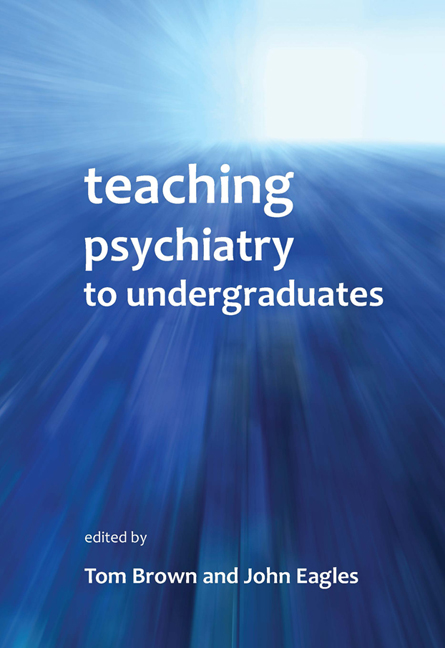Book contents
- Frontmatter
- Contents
- List of figures, tables and boxes
- List of contributors
- Preface
- Foreword
- 1 How do students learn?
- 2 Recent developments in undergraduate medical education
- 3 Undergraduate psychiatry teaching – the core curriculum
- 4 The organisation of undergraduate teaching
- 5 Assessment of undergraduates in psychiatry
- 6 Using computers to teach undergraduate psychiatry
- 7 How to give a lecture
- 8 How to do small-group teaching
- 9 Problem-based learning
- 10 Teaching trainee psychiatrists how to teach medical students: the Southampton model
- 11 Involving trainees in teaching
- 12 Involvement of service users in psychiatric education
- 13 Time-efficient clinical teaching
- 14 Intercalated degrees
- 15 Undergraduate experiences of psychiatry: a student view
- 16 Integration: teaching psychiatry with other specialties
- 17 Teaching the teachers in a cross-cultural setting: the Scotland–Malawi Mental Health Education Project
- 18 International undergraduate teaching
- 19 Teaching with simulated patients and role-play
- 20 Undergraduate medical education and recruitment to psychiatry
- 21 Choosing psychiatry: factors influencing career choice among foundation doctors in Scotland
- 22 Funding of the teaching of medical undergraduates
- 23 Dealing with students in difficulty
- 24 Training medical students to promote good mental health in secondary schools
- 25 Women in medicine
- Index
24 - Training medical students to promote good mental health in secondary schools
- Frontmatter
- Contents
- List of figures, tables and boxes
- List of contributors
- Preface
- Foreword
- 1 How do students learn?
- 2 Recent developments in undergraduate medical education
- 3 Undergraduate psychiatry teaching – the core curriculum
- 4 The organisation of undergraduate teaching
- 5 Assessment of undergraduates in psychiatry
- 6 Using computers to teach undergraduate psychiatry
- 7 How to give a lecture
- 8 How to do small-group teaching
- 9 Problem-based learning
- 10 Teaching trainee psychiatrists how to teach medical students: the Southampton model
- 11 Involving trainees in teaching
- 12 Involvement of service users in psychiatric education
- 13 Time-efficient clinical teaching
- 14 Intercalated degrees
- 15 Undergraduate experiences of psychiatry: a student view
- 16 Integration: teaching psychiatry with other specialties
- 17 Teaching the teachers in a cross-cultural setting: the Scotland–Malawi Mental Health Education Project
- 18 International undergraduate teaching
- 19 Teaching with simulated patients and role-play
- 20 Undergraduate medical education and recruitment to psychiatry
- 21 Choosing psychiatry: factors influencing career choice among foundation doctors in Scotland
- 22 Funding of the teaching of medical undergraduates
- 23 Dealing with students in difficulty
- 24 Training medical students to promote good mental health in secondary schools
- 25 Women in medicine
- Index
Summary
Introduction
This chapter describes the creation of a mental health educational intervention, its delivery in secondary schools and its development into a module within the undergraduate medical curriculum.
Background to educational interventions in schools
Stigmatisation of psychiatric illness has been evident for as long as illness has existed (Bhugra, 1989). It has long been recognised that a great deal of fear and misunderstanding surround mental illness (Byrne, 1997; Link et al, 1997; Jorm et al, 1999). Even today, stigmatising attitudes are widespread and people with mental health problems such as schizophrenia, alcoholism or substance misuse are often perceived as violent and unpredictable (Crisp et al, 2000). These attitudes prevail in the general population but are also known to be present within the medical profession. More than half of the medical students and doctors surveyed by Mukherjee et al (2002) shared such beliefs. Negative opinions appear to lessen as a doctor's career progresses, which suggests that improved education at an earlier stage of medical training, and exposure to psychiatry in practice, may lead to the adoption of more reasonable attitudes.
Stigmatising attitudes and negative stereotypes form at an early age (Wahl et al, 2002). Evaluation of school programmes suggests that education is an effective tool in improving understanding of mental health. This is particularly evident if the intervention incorporates contact with people suffering from mental health problems (Esters et al, 1998; Pinfold et al, 2003; Shulze et al, 2003).
Adults with a better understanding of mental illness are less likely to endorse stigma and discrimination (Roman & Floyd 1981; Link & Cullen, 1986; Link et al, 1987; Brockington et al, 1993). It can therefore be postulated that enhancing understanding in children may prevent the development of such prejudice. In light of this evidence, a group of senior trainees on the Public Education Committee of the Royal College of Psychiatrists in Northern Ireland sought to develop a mental health educational intervention for school students.
- Type
- Chapter
- Information
- Teaching Psychiatry to Undergraduates , pp. 286 - 300Publisher: Royal College of PsychiatristsPrint publication year: 2011



